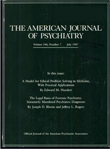Assessing borderline personality disorder with self-report, clinical interview, or semistructured interview
Abstract
The authors compared three methods of assessing borderline personality disorders. Test-retest reliability for the self-report Personality Diagnostic Questionnaire was adequate and compared favorably with the interrater reliability of the DSM-III-oriented clinical interview and the semistructured research interview. The overall prevalence of personality disorders scored on the questionnaire was similar to that generated by the clinical interview. The specificity and sensitivity of the questionnaire for the diagnosis of borderline personality disorder were slightly higher than 60%, which suggests that it may be a useful and economical instrument for identifying patients with borderline personality disorder.
Access content
To read the fulltext, please use one of the options below to sign in or purchase access.- Personal login
- Institutional Login
- Sign in via OpenAthens
- Register for access
-
Please login/register if you wish to pair your device and check access availability.
Not a subscriber?
PsychiatryOnline subscription options offer access to the DSM-5 library, books, journals, CME, and patient resources. This all-in-one virtual library provides psychiatrists and mental health professionals with key resources for diagnosis, treatment, research, and professional development.
Need more help? PsychiatryOnline Customer Service may be reached by emailing [email protected] or by calling 800-368-5777 (in the U.S.) or 703-907-7322 (outside the U.S.).



